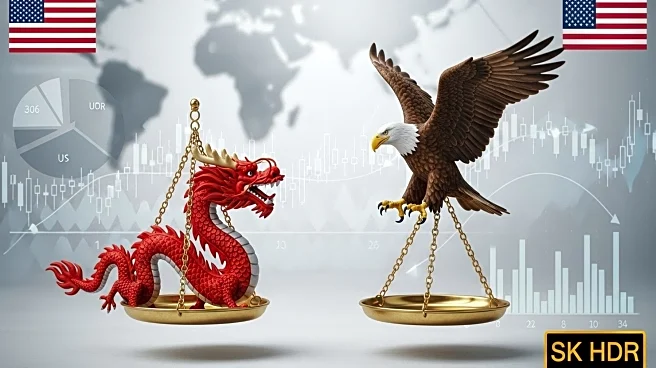What's Happening?
The Chinese government has escalated its response to the United States Trade Representative (USTR) fees by imposing sanctions on Hanwha's U.S. operations. This move comes as both countries began collecting port fees linked to each other's shipping and shipbuilding industries, intensifying the ongoing trade war. The sanctions target Hanwha Philly Shipyard, Hanwha Shipping, Hanwha Ocean USA International, Hanwha Shipping Holdings, and HS USA Holdings. Hanwha, a Korean company, has been expanding its U.S. shipbuilding operations and plans to build tankers and LNG carriers flagged in the United States for international trade. The sanctions will restrict Hanwha's access to Chinese suppliers for components and equipment, impacting its operations. China has also announced an investigation into the USTR program, indicating potential further responses.
Why It's Important?
The sanctions against Hanwha highlight the escalating trade tensions between the United States and China, affecting international business operations and supply chains. Hanwha's expansion into the U.S. shipbuilding market is now threatened by restricted access to Chinese suppliers, which could hinder its growth and operational capabilities. This development is part of a broader trade conflict that includes new tariffs and import restrictions on Chinese goods by the Trump administration. The sanctions could lead to increased costs and operational challenges for Hanwha and other companies involved in U.S.-China trade, potentially impacting the shipping industry and international trade relations.
What's Next?
President Trump and China's President Xi Jinping are scheduled to meet later this month during an Asian conference, which could provide an opportunity for dialogue and negotiation. However, the continuation of working-level talks and the broader trade discussions remain uncertain. The USTR plans to add further tariffs on Chinese-made port equipment, which could exacerbate tensions. The outcome of these meetings and negotiations will be crucial in determining the future of U.S.-China trade relations and the potential resolution of ongoing disputes.
Beyond the Headlines
The sanctions on Hanwha reflect deeper geopolitical and economic conflicts between the United States and China. The trade war has broader implications for global supply chains, international trade policies, and economic stability. The restrictions on Hanwha's operations could lead to shifts in the shipbuilding industry, with companies seeking alternative suppliers and markets. Additionally, the trade tensions may influence diplomatic relations and international cooperation, as both countries navigate complex economic and political landscapes.












